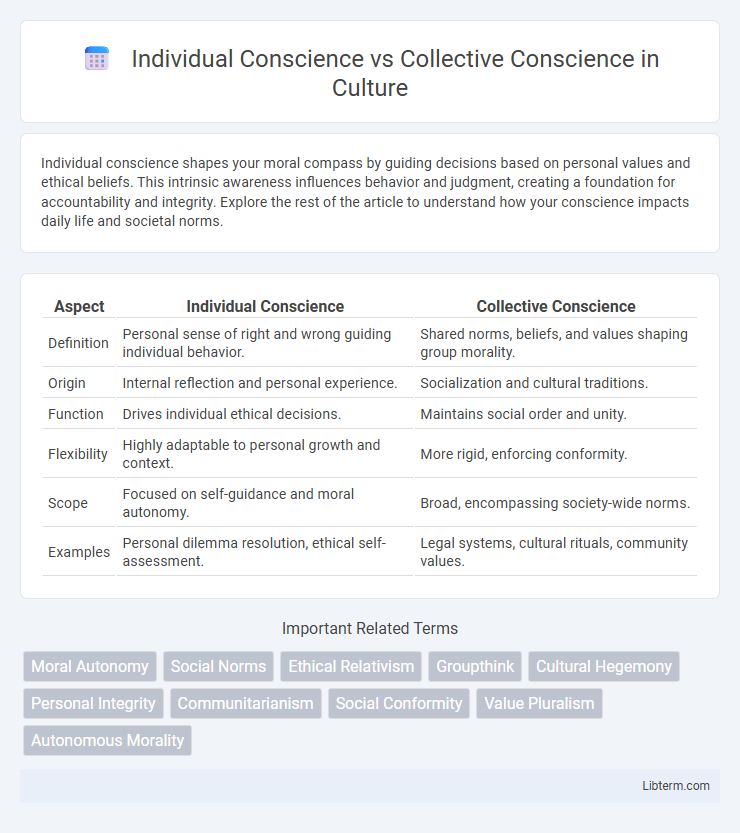Individual conscience shapes your moral compass by guiding decisions based on personal values and ethical beliefs. This intrinsic awareness influences behavior and judgment, creating a foundation for accountability and integrity. Explore the rest of the article to understand how your conscience impacts daily life and societal norms.
Table of Comparison
| Aspect | Individual Conscience | Collective Conscience |
|---|---|---|
| Definition | Personal sense of right and wrong guiding individual behavior. | Shared norms, beliefs, and values shaping group morality. |
| Origin | Internal reflection and personal experience. | Socialization and cultural traditions. |
| Function | Drives individual ethical decisions. | Maintains social order and unity. |
| Flexibility | Highly adaptable to personal growth and context. | More rigid, enforcing conformity. |
| Scope | Focused on self-guidance and moral autonomy. | Broad, encompassing society-wide norms. |
| Examples | Personal dilemma resolution, ethical self-assessment. | Legal systems, cultural rituals, community values. |
Understanding Individual Conscience
Individual conscience represents the personal sense of right and wrong shaped by unique experiences, moral reasoning, and internal reflection. It functions independently from collective conscience, which embodies the shared norms and values of a society or group, often influencing but not determining personal ethical judgments. Understanding individual conscience requires recognizing its role in guiding behavior through subjective ethical evaluation, distinct from societal pressures or collective agreement.
Defining Collective Conscience
Collective conscience refers to the set of shared beliefs, values, norms, and moral attitudes that operate as a unifying force within a society or group. It shapes individuals' behaviors by establishing common standards and creating social cohesion, often influencing laws and cultural practices. Emile Durkheim introduced this concept to explain how social order is maintained through collective consciousness rather than individual self-interest.
Historical Evolution of Conscience
The historical evolution of conscience reveals a dynamic interplay between individual conscience, emphasizing personal moral judgment, and collective conscience, representing shared societal norms and values. In ancient societies, collective conscience dominated as communal beliefs guided behavior, while the Enlightenment era sparked a shift toward individual conscience through rationalism and personal autonomy. Modern ethical frameworks balance these forces, recognizing the role of collective conscience in social cohesion alongside the safeguarding of individual moral responsibility.
The Role of Culture in Shaping Morality
Culture profoundly shapes both individual and collective conscience by embedding shared values, norms, and ethical frameworks that influence moral judgments and behavior. Individual conscience develops through internalization of cultural teachings, socialization practices, and communal experiences, reflecting the intersection of personal beliefs with societal expectations. Collective conscience emerges as a social construct, unified by cultural narratives and rituals that reinforce group cohesion and define acceptable moral conduct.
Conflicts Between Personal and Societal Values
Conflicts between individual conscience and collective conscience arise when personal moral beliefs clash with societal norms, creating tension in decision-making and social behavior. These disputes often manifest in areas such as civil disobedience, religious freedom, and ethical dissent, where individuals challenge dominant cultural values to uphold personal integrity. Balancing respect for individual autonomy with the preservation of social cohesion remains a central issue in ethics, law, and political philosophy.
Case Studies: Individual vs Collective Decisions
Case studies on individual versus collective decisions reveal distinct outcomes in fields like psychology, sociology, and organizational behavior. Research shows that individual conscience often leads to innovative and morally driven choices due to personal accountability and ethical reflection. In contrast, collective conscience tends to promote social cohesion and norm adherence, but can result in groupthink or conformity, impacting decision quality and ethical responsibility.
The Impact on Social Change and Reform
Individual conscience drives personal moral judgment that challenges established norms, becoming a catalyst for social change by inspiring grassroots movements and ethical reform. Collective conscience embodies shared beliefs and values that shape societal cohesion, influencing the acceptance or resistance of reforms within communities. The dynamic interplay between personal conviction and communal consensus determines the pace and effectiveness of social transformation.
Ethical Dilemmas in Modern Society
Ethical dilemmas in modern society often arise from conflicts between individual conscience, which emphasizes personal moral judgment, and collective conscience, representing shared societal norms and values. These tensions surface in debates over issues like data privacy, environmental responsibility, and social justice, where individual autonomy clashes with group expectations and legal frameworks. Understanding the dynamic interplay between individual conscience and collective conscience is crucial for developing ethical guidelines that respect personal integrity while upholding communal well-being.
Navigating Moral Responsibility Today
Navigating moral responsibility today requires balancing individual conscience, which drives personal ethical decisions based on self-reflection and values, with collective conscience, representing shared societal norms and cultural beliefs. Ethical frameworks such as virtue ethics and social contract theory provide tools for understanding how personal and collective duties intersect in complex social environments. Emphasizing empathy, dialogue, and critical thinking fosters harmony between individual integrity and community well-being in contemporary moral challenges.
Balancing Autonomy and Community Ethics
Balancing individual conscience and collective conscience requires recognizing personal autonomy while respecting community ethics that uphold social harmony. Individual conscience drives moral decision-making based on personal values and critical thinking, whereas collective conscience reflects shared norms and ethical standards essential for group cohesion. Achieving equilibrium involves fostering dialogue that integrates diverse personal beliefs with communal responsibilities, promoting ethical pluralism without undermining social order.
Individual Conscience Infographic

 libterm.com
libterm.com